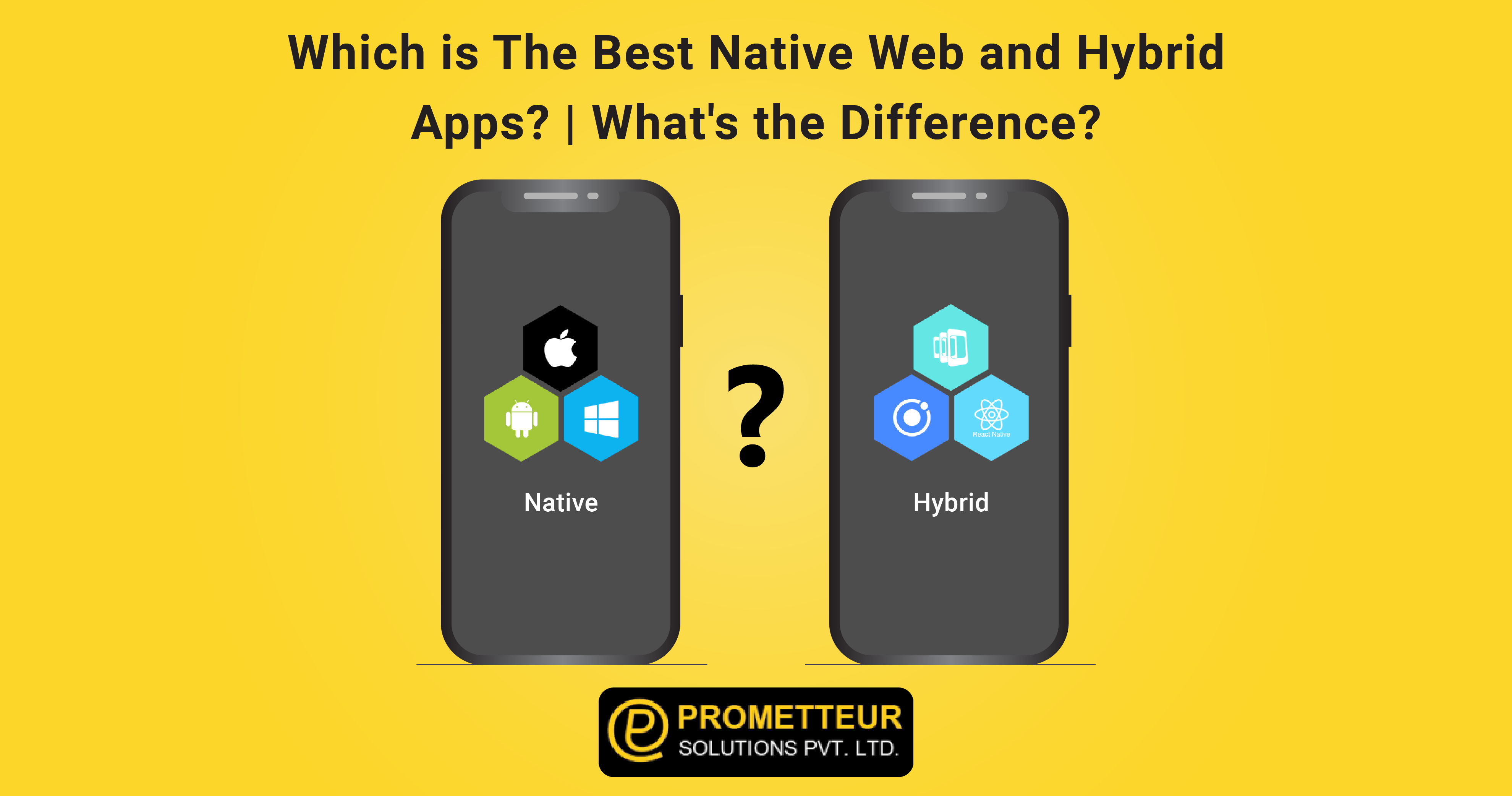An app is a computer program with the design to perform a specific task. In today’s world, the software can be run from a desktop or laptop as well as from mobile devices such as cell phones and tablets. Apps are sometimes known as “software” or “applications”.
Native Apps are installed on a user’s device, which is connected to the user’s operating system. A web app uses a browser to present an interface to the user, who can use it via any internet-enabled device. Hybrid apps are built by utilizing features of Native Web and Hybrid Apps.
Native Web and Hybrid Apps
Native, Web, and Hybrid Apps are best for offline functionality, where data can be saved securely on the device itself. They also don’t require an internet connection to use them, which means that they are more reliable during emergencies. But they have some disadvantages as well – they need installation time and higher processing power due to their heavy nature.
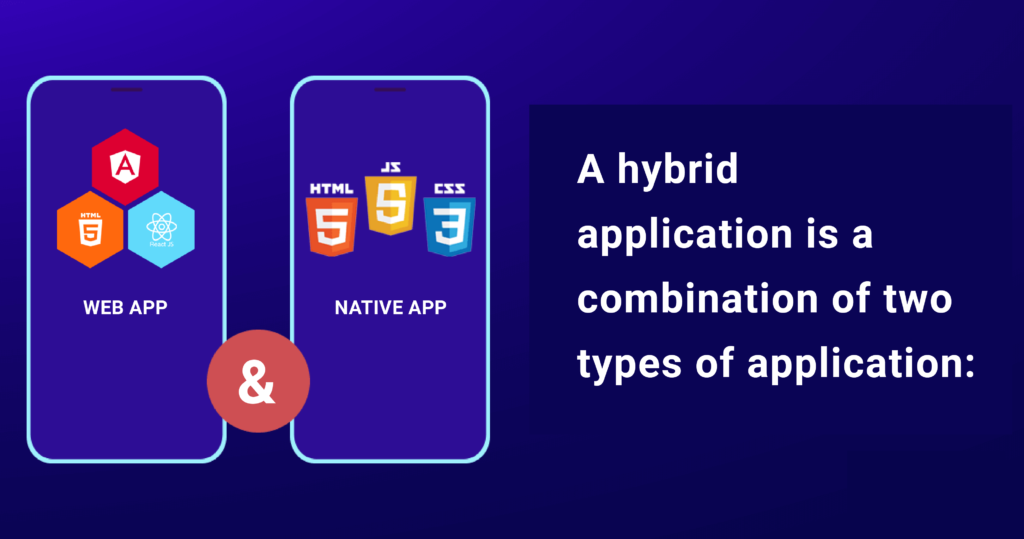
Web Apps have the advantage of being browser-based so they don’t need installation time or high processing power but have one disadvantage not being able to work offline or without an internet connection. A hybrid application is a combination of two types of application: a web application plus a native application. A website wrapped in an app shell that can be installed on your device.
The majority of hybrid applications are created with the use of one or more Native, Web, and Hybrid app frameworks, such as PhoneGap, Xamarin, Ionic, and React Native. In some cases, it is preferred to create an Android-only app with Java programming language using the Android SDK, the same goes for iOS-only apps with Swift programming language.
Why You Should Choose Between Native, Web or Hybrid App Development?
The application market is vast and contains a variety of applications, some of which work for everyone while others do not. It can be confusing trying to filter out the good from the bad.
There are a lot of different types of applications that may not be suitable for your company’s specific needs. This means that while you might have found a few that work well, you will still be missing out on other applications like Native, Web, and Hybrid Apps that could have been perfect for your business. This will not only lead to a less productive business, but it will also mean less time saved on the whole process.
To get the very best from your business, you need to have an application with all of the necessary features. In case you are wondering why you need to select a certain sort of application for your company’s success since the application market as a whole is rapidly expanding. There are different reasons and they include:
- Because different applications are produced and designed for different reasons, it is essential to find a mobile app development firm that can assist you in developing an app with a specific aim in mind. When you combine your app type with a defined goal, you’ll be able to better address the demands of your target audience.
- When it comes to developing apps, the most agonizing worry for businesses is the development cost, which varies widely depending on the application you choose to develop.
- Because applications require long-term maintenance and support, it’s critical to pick an app that’s simple to maintain and upgrade with new versions.
Hybrid, Native and Web Apps: Their Differences
Native Apps
When it comes to user experience, the advantage of using a native app is that it is the fastest and most dependable. Native apps may also connect with all of the functions of the device’s operating system, including the microphone, camera, and contact lists. However, if you want to design your app for various platforms (e.g., iPhones and Android) and maintain your native app updated, you’ll need a larger budget.
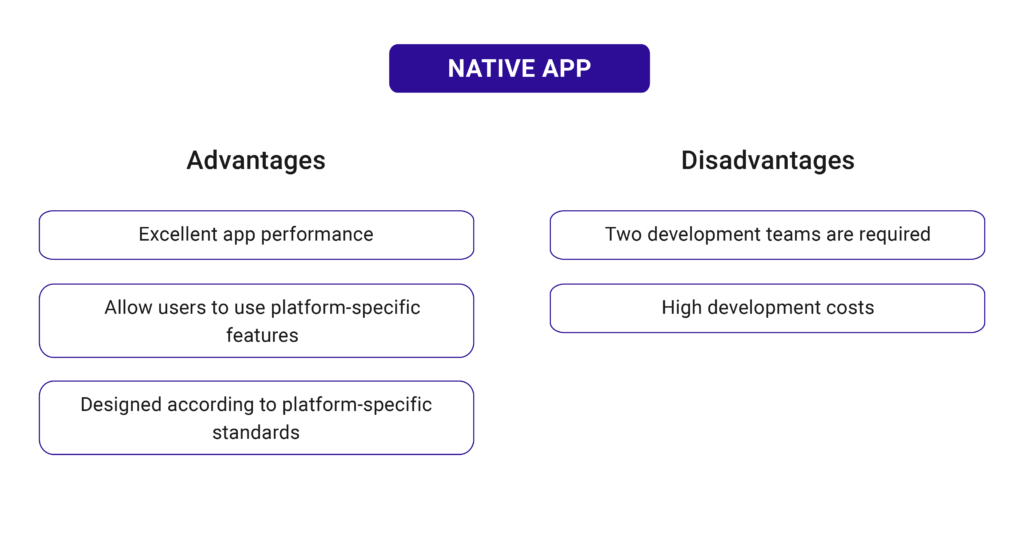
Advantages of native apps
- Excellent app performance: Native apps operate more smoothly and efficiently, especially when they include complicated computations and visuals. The browser environment is the simplest and fastest way to build a web app, but it can be limiting. Native apps offer a better experience for users. Many of the apps we use daily are native apps. Facebook, Whatsapp, Gboard, Messenger, Spotify — all these companies and more have made the switch to mobile with mobile-first design and intuitive navigation. Here’s why: Native app experiences perform better than mobile web experiences and support richer interactions and animations.
- Allow users to use platform-specific features: The nicest thing about native applications is that they may take advantage of a device’s or platform’s built-in functionalities. Users need the ability to use platform-specific features on their devices and platforms. Enable users to experience your app with the best possible experience. If you are looking for an advantage, use native applications instead of web-based ones. Native applications are built using the user’s device or platform’s functionalities to create a more natural user experience that can help you build loyal customers who come to rely on your product for their everyday needs.
- Because apps are designed according to platform-specific standards, a faultless user experience is assured. Cross-platform apps are difficult to maintain and can lead to problems. With a unique app for each platform, an excellent user experience is assured.
The best apps in the world are tailored to each platform and device, but this requires a lot of time and money. If you’re unable to produce a faultless user experience due to the cost of using different platforms, then you’re putting your business’s reputation at risk.
The Disadvantages of Native Apps
- Two development teams are required: Because native Android applications are often written in Java or Kotlin, and native iOS apps are written in Objective-C or Swift, you’ll need to recruit mobile app developers who are familiar with both methodologies.
- Native apps are appropriate for large organizations with larger app development budgets due to their high development costs. Because each native app must be built from the ground up, it takes more time and resources to produce an app, which increases your budget.
Web Apps
Web apps are web pages that include interactions comparable to that of a smartphone app. The Web apps are developed in HTML5 and/or Javascript and run in a variety of browsers, including Safari and Chrome. Building a web app might be the most cost-effective alternative if your firm is on a tight budget and doesn’t require complicated functionality or access to operating system tools. Web applications, on the other hand, might be slower, less intuitive, and not available through app stores. Additionally, your customers will not have your web app’s icon downloaded to their home screens, so they will not be reminded to utilize it regularly.
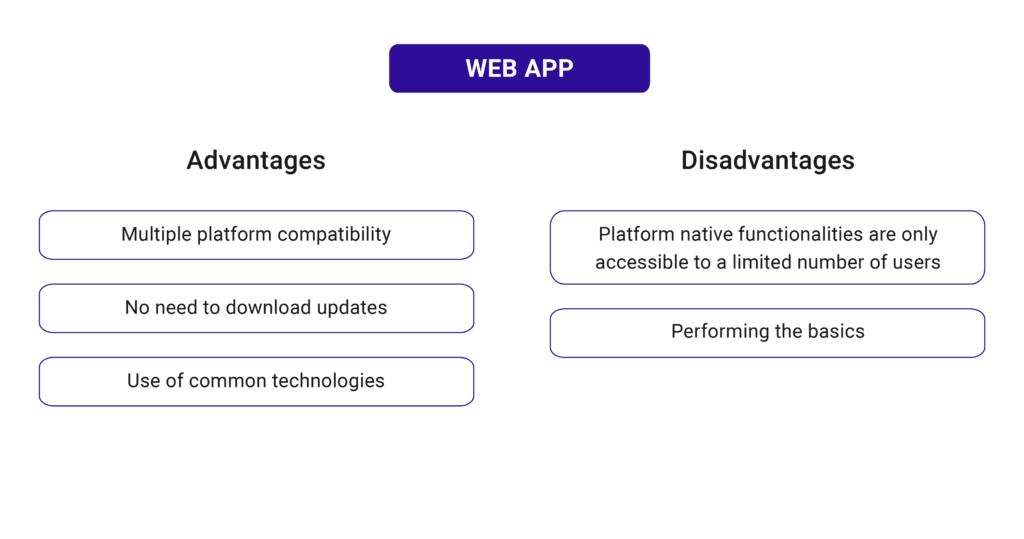
Benefits of Web Apps
- Multiple platform compatibility: Eye-catching apps are usually limited to smartphones and tablets. But what if your app needs to work on desktop computers too? How frustrating is it that you can only develop an app for one platform, leaving other users out of the fun?
Once a web application is created, it may be quickly adapted to operate on any platform without requiring additional development effort.
- Users may always access the most recent versions of your program with hybrid applications, so there’s no need to download updates. People are always wary of installing updates to their computer programs because it seems like they’re just adding additional steps to their life. With hybrid applications, your product can be updated without the user even realizing it. By using this method, you don’t need to make your customers confront updates or installations because all they have to do is open their program and wait for the changes to take place.
Therefore, if you’re looking for a way to keep customers updated without making them feel like they’re updated, the hybrid application is the easiest solution available. It will allow customers access to the newest versions of software without needing any downloadable updates or installations.
- Use of common technologies: Because web apps can be built using a variety of technologies, selecting the finest software development business has never been a problem for entrepreneurs.
Web App Disadvantages
- Platform native functionalities are only accessible to a limited number of users: The camera, storage, contacts, and other built-in functionality of your smartphone are not accessible through a web app.
- Performing the basics: Simple applications, like new publishers and online storefronts, perform well with web apps.
Hybrid apps
Hybrid apps are usually simpler and quicker to create than native apps. They also need less upkeep. The speed of your hybrid app, on the other hand, will be entirely dependent on the user’s browser. As a result, hybrid apps will nearly never perform as well as native apps. Hybrid applications have the benefit of being able to be built on a single platform, allowing you to add new features to numerous versions of your app. Every new feature you wish to introduce for each platform will have to be replicated in native applications.
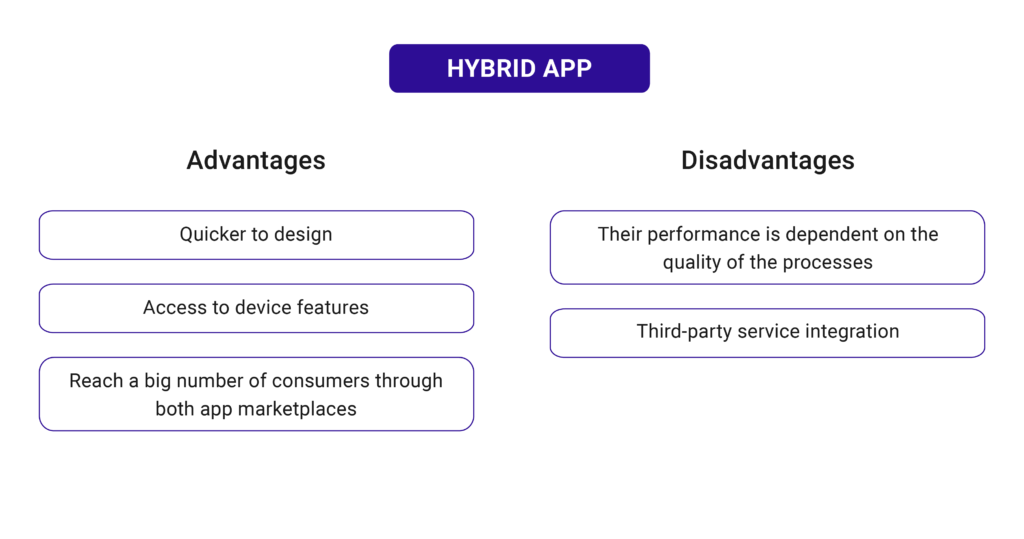
Benefits of Hybrid Apps
- Hybrid apps are quicker to design since they are built using common web technologies that are straightforward to maintain in the long run.
- Access to device features: You can use the device’s native functionality even if you’re using a hybrid app.
- They are disseminated across many platforms and may reach a big number of consumers through both app marketplaces.
Hybrid Applications’ Drawbacks
- They perform poorly when compared to native apps since their performance is dependent on the quality of the processes that show the user interface and run the code. Performance will be improved if the gadget is quicker.
- Third-party service integration: You can’t make a hybrid app with just JavaScript. You’ll need to use hybrid app development frameworks like Cordova, Ionic, or React Native, all of which have their own learning curves.
Their User Experience
The user experience (UX) and user interface (UI) of a mobile app account for 70% of its retention rate. A top mobile app development firm, on the other hand, can assist you in achieving a 100% retention rate with few bugs or UX problems, as well as designing an app that follows the newest UI trends. And the app’s user experience is directly tied to the audience you’re attempting to reach. You’ll build the app utilizing the proper technologies to make it a great fit for the audience’s preferences, choices, and interests.
Apps that are native to the device
Determine which group of people you’re targeting. Android native applications are free to download, but iOS native apps are paid apps. Keep in mind, though, that native applications require frequent upgrades in order to provide a great user experience.
Web-based applications
Web applications are free to use on any device and browser, allowing you to reach the broadest possible audience. Web apps are also easier to maintain than native apps since they require fewer updates.
Apps with a hybrid design
If you want to reach the biggest number of consumers across different platforms while keeping the number of updates to minimal, hybrid applications are the way to go. Second, native and hybrid applications are the best options if your target consumers will download the program and use it offline.
Conclusion
Hopefully, you now understand the distinctions between these three important sorts of applications. To wrap off this post, it’s worth noting that each sort of software has its own set of benefits and drawbacks. Again, the type of app development you choose will be influenced by your target audience, their tastes, and your budget.
